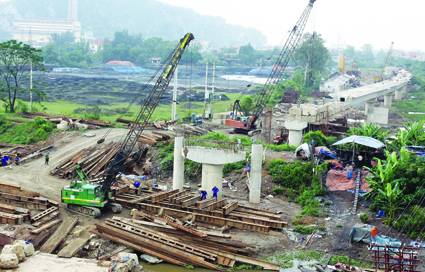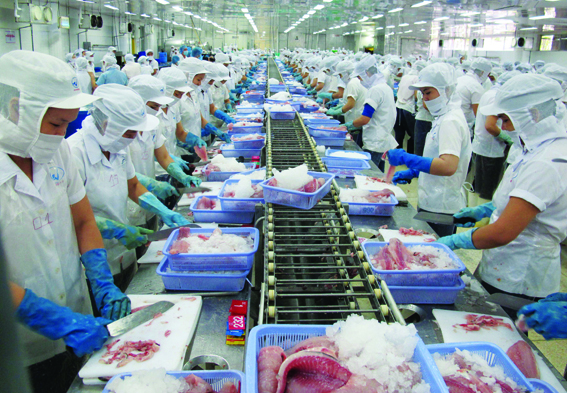>>Revised Penal Code restricts death penalty, increases non-jail sentences
According to the Justice Ministry’s report, the Law Revising a Number of Articles of the Penal Code (the Law) covers reduction of death penalty; adjustment of quantitative amounts for examining penal liability for a number of crimes and adjustment of crime-constituting elements and penalties for economic, environmental, scientific and technological, human trafficking, terrorist, and money laundering crimes. It also adds new criminal acts in line with the Party’s and the State’s judicial reform and humanization policies for removing problems in the fight against crimes and meeting international integration requirements.
The Law, which revises 44 articles of the current Penal Code and adds 13 new ones, takes effect on January 1, 2010.
Crimes of infringing upon economic management order
The crime of speculation (Article 160) is added with acts of speculation in a situation of economic difficulties with a view to stabilizing the market and prices and controlling inflation.
The quantitative amounts of evaded tax under Article 161 are increased to meet practical requirements.
Article 171 on the crime of infringing upon industrial property rights is amended in accordance with treaties to which Vietnam is a contracting party, especially the World Trade Organization’s agreements and the Vietnam-US Bilateral Trade Agreement.
Compared to current regulations, the Law narrows the scope of acts of infringing upon industrial property rights liable to criminal punishment. Criminal penalties will apply only to infringing acts on a commercial scale and those involving two subject matters of industrial property: trademarks and geographical indicators. Higher fines will be imposed on acts of infringing upon industrial property rights for inventions, utility solutions, industrial designs or other subject matters of industrial property.
Article 174 on the crime of violating land management regulations is revised to create a legal basis for promptly applying criminal penalties to violators who have not ever been disciplined but whose violations cause serious consequences.
Environmental crimes
The Law increases fines for environmental crimes, and amends a number of environmental crimes defined in Chapter XVII of the Penal Code. It consolidates three crimes of polluting the environment (air, water source and soil) into a crime of polluting the environment, and provides more flexible regulations on elements constituting these crimes.
Specifically, criminal measures will be taken against acts of discharging into the air or water sources or burying in soil environmental pollutants which are beyond national technical regulations on wastes to a serious extent or seriously pollute the environment or cause other serious consequences.
The crime of importing technologies, machinery, equipment, discarded materials or substances which fail to satisfy environmental protection standards (Article 185) is revised into the crime of bringing wastes into the Vietnamese territory. Persons who take advantage of importing such things or use other tricks to bring wastes into the Vietnamese territory will be criminally handled.
The crimes of violating regulations on protection of wildlife and special protection of nature conservation zones (Articles 190 and 191) are also revised to comply with the Law on Environmental Protection and practical conditions.
Information technology crimes
The Law increases penalties and revises crime-constituting elements defined in Articles 224, 225 and 226 of the Penal Code in pursuance to the Law on Information Technology and Government Decree No. 55/2001/ND-CP of August 23, 2001, on management, provision and use of Internet services.
Elements constituting the crime of transmitting harmful computer viruses or programs consist of criminal act (intentionally spreading harmful computer viruses or programs); spread objects (harmful computer viruses and programs); and handling policy (criminal measures will apply to this act only when it causes serious consequences). Aggravating circumstances (causing very serious consequences, committing crimes in an organized manner, or dangerous recidivism) and specially aggravating circumstances (causing specially serious consequences; committing crimes related to national information infrastructure, databases classified as state secrets, security and defense, financial and banking or traffic control information, or information for the national grid administration) are also specified.
With regard to the crime of obstructing or disordering operation of the computer, telecommunications or Internet network or digital equipment, the Law prescribes three groups of acts constituting this crime; four infringed objects (computer network, telecommunications network, Internet network, and digital equipment); aggravating circumstances (added with the case of committing crimes while taking advantage of the right to administer the computer, telecommunications or Internet network). These are all new provisions compared to the 1999 Penal Code.
The crime of illegally uploading onto or using information on the network consists of three acts: illegally using information on the network or in computer; inputting into the computer network information in contravention of law; and trading, exchanging, donating, repairing, modifying or publicizing lawful private information of other agencies, organizations or individuals on that network without permission of the owners of such information. The Law also provides for handling measures (criminal measures will apply to this act only when interests of organiza-tions or individuals are harmed or social order and safety are infringed, causing serious consequences) and aggravating circumstances (added with the case of gaining illegal benefits valued at VND 100 million or more).
Money laundering crimes
To further improve regulations on money laundering crimes for effectively fighting these crimes and facilitating international cooperation in anti-money laundering activities, the Law revises Article 251 of the Penal Code by covering money laundering acts mentioned in the Convention against Transnational Organized Crime and recommendations of the Financial Action Task Force on Money Laundering. Accordingly, the money laundering crime comprises the following four groups of acts:
- Directly or indirectly participating in financial, banking or other transactions related to money amounts or assets which are known to originate from crime commission with a view to concealing the unlawful origin of such money or assets;
- Using money amounts or assets which are known to originate from crime commission for carrying out business or other activities;
- Hiding information on the origin, nature, location, removal or ownership of money amounts or assets which are known to originate from crime commission or obstructing the verification of such information;
- Committing either of the above acts for money amounts or assets which are known to originate from the removal, transfer or exchange of such money or assets.
The Law adds six aggravating circumstances: committing crimes in a professional manner; using sophisticated or cunning tricks; money amounts or assets originating from crime commission are of high value; gaining high illegal profits; causing serious consequences; and dangerous recidivism, which will be subject to an imprisonment of between eight and 15 years.
Under the National Assembly Resolution on enforcement of the Law, the Law will apply to investigation, prosecution, trial and enforcement of judgments for persons committing criminal acts from 0:00 hrs. of January 1, 2010. Particularly, the provisions abolishing the death penalty for a number of crimes and not applying criminal measures to a number of acts take effect right on June 29, 2009, when the President promulgated this Law. The Resolution also provides for the retroactive effect of a number of provisions of the Law.-

